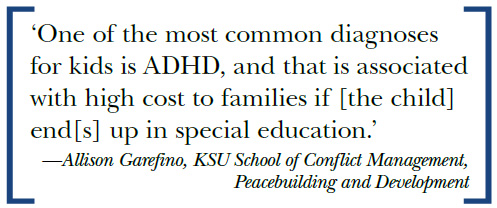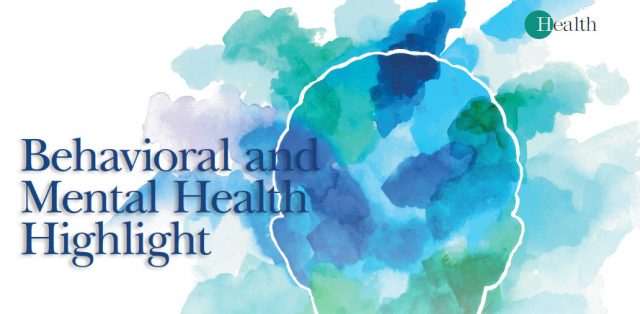When we think about our health, we often consider the physical problems. Does my back hurt? Is this cough ever going away? While these outward symptoms are important to pay attention to, there are also the challenges that mental and behavioral issues pose that can affect our everyday lives. These unseen problems may often seem far too complex to surmount; however, there are a number of nonprofits, educational institutions and companies in Cobb County that are working to help you and your family live a happier and healthier lifestyle.
From psychiatric conditions like Attention Deficit Hyperactivity Disorder (ADHD) that can lead to behavioral problems, often associated with social and academic difficulties, to the more symptomatic problems of conditions like depression and anxiety — which may lead to substance abuse and addiction — Cobb County offers a range of resources whose main goal is to improve the mind, body and spirit.
Parenting Strategies Program at
Kennesaw State University
365 Cobb Ave., Kennesaw, GA 30144
(470) 578-2379
conflict.hss.kennesaw.edu
While Allison Garefino was serving as a part-time assistant professor with Kennesaw State University’s psychology department, which works closely with the School of Conflict Management, Peacebuilding and Development, she realized there was a countywide need that wasn’t being fulfilled. “[The school] always had as part of its mission to help parents with children with individual education plans, and never had anyone on staff. It was something they had to contract. When they found out that was my area of expertise, it was great because I was trained in a very similar program to what we are rolling out here.”
Launched in February, 2017, the Parenting Strategies program is for parents of 5-12-year-olds with ADHD and/or behavioral problems. The six-week interactive workshop (sessions are also offered individually) offers children the opportunity to participate in social skills groups while parents work together to learn behavior management techniques and solve problems. The goal is to help parents promote positive changes in their children’s home and school behavior.
Garefino graduated from the University of Pittsburgh and earned her Ph.D. in clinical psychology from the State University of New York at Buffalo. There, she worked as clinical director at the Center for Children and Families under Dr. William Pelham Jr., who developed a state-of-the-art summer treatment program for children and adolescents with ADHD. She has also led many parenting strategies workshops and helped develop and implement school-wide behavioral interventions.
 “One of the most common diagnoses for kids is ADHD, and that is associated with high cost to families if [the child] end[s] up in special education. It’s related to long-term outcomes of school truancy, school dropouts, expulsion, delinquency and violence down the road, which also goes hand-in-hand with the conflict management portion.” Garefino explains that many scientific studies have demonstrated the best way to prevent many of these negative outcomes associated with an ADHD diagnosis is to implement behavioral interventions as early as possible. “So that’s why we’re rolling out this program: to actually lower costs to society, lower costs to families and provide an actual evidence-based, long-term treatment for these kids who have been diagnosed with these disruptive behaviors.”
“One of the most common diagnoses for kids is ADHD, and that is associated with high cost to families if [the child] end[s] up in special education. It’s related to long-term outcomes of school truancy, school dropouts, expulsion, delinquency and violence down the road, which also goes hand-in-hand with the conflict management portion.” Garefino explains that many scientific studies have demonstrated the best way to prevent many of these negative outcomes associated with an ADHD diagnosis is to implement behavioral interventions as early as possible. “So that’s why we’re rolling out this program: to actually lower costs to society, lower costs to families and provide an actual evidence-based, long-term treatment for these kids who have been diagnosed with these disruptive behaviors.”
There are three main evidence-based treatments for children with ADHD: behavior modification, stimulant medication or the combination of both, explains Garefino. The Parenting Strategies program implements evidence-based behavioral strategies recommended by the American Academy of Pediatrics and the American Psychological Association. According to research, if behavioral intervention alone is used before medical interventions, there is typically a much lower cost to families and more long-term positive outcomes than medication has shown alone, says Garefino.
With behavior modification, it’s important that everyone involved in the child’s life — parents, teachers and relatives — learn how to communicate effectively using proven strategies. “We’ve heard a lot from parents: ‘We’ve tried everything! Nothing works!’ Well, they’re probably not doing things that their child, who doesn’t do typical behaviors, needs. So in the six-week parenting program, we’ll be teaching the strategies they can do throughout the weeks at home with their children that will increase the positive behaviors [and] decrease the negative behaviors. These are techniques that parents can take with them moving forward and problem-solve with future behaviors. When new things come up, they’ll have a toolkit they can pull from moving forward.”
Meanwhile, the children will participate in a social skills program with a focus on communication, cooperation, participation and validation. “We’ll be working with the kids, giving them positive reinforcement for positive behavior, and at the same time introducing the concepts we’re introducing to parents.”
Cobb Community Alliance to Prevent Substance Abuse (CCAPSA)
3162 Johnson Ferry Road, Suite 260, #823
Marietta, GA 30062
(404) 791-7406
ccapsa.org
Jim Verecchia, executive director of the Cobb Community Alliance to Prevent Substance Abuse (CCAPSA), considers himself lucky his family and circle of friends haven’t been directly impacted by substance abuse. As a leading member of the nonprofit community, he was recruited by other county leaders for his position and was overwhelmed by the statistics he was told; specifically, last year, Cobb County ranked No. 2 in the state in the number of deaths related to substance abuse. “The majority of the people in our county don’t recognize what’s going on around them,” says Verecchia.
Motivated to help his community, Verecchia leads the nonprofit in addressing alcohol, tobacco and other substance use in Cobb. Through the collaborative efforts of countywide partnerships, the group provides a comprehensive approach to combat and prevent the onset of abusive substance usage. “Awareness of the problem is No. 1,” Verecchia says, adding he is always looking for opportunities to speak to county residents — that includes adults and senior citizens, not just school-aged children. “You can talk to kids, which is great, but you need to really engage the adult community — not because it’s their kid necessarily, but it’s probably in their neighborhood.”
Secondly, CCAPSA seeks to employ evidence-based programs. “For example, if a school contacts us, we can then design a program with them for their faculty, students and parents. Or for a church community, we can implement what they need,” says Verecchia. These education initiatives typically focus on a range of priorities and action items, including limiting access to substance of abuse; decreasing the ease, ability and opportunity for youth access to alcohol, tobacco and other drugs; and changing the culture and context within which decisions about substance use are made.
The last part of CCAPSA’s mission is to inspire and mobilize people to do something further. “That could be advocacy in the legislature, it could be mobilizing people to come on board with volunteer work, to teach, to get out and speak — in other words, do something about the issue,” adds Verecchia.
In 2017, Verecchia says he hopes to further the nonprofit’s goal of becoming a central resource in Cobb that opens the lines of communications between all community stakeholders. “One of the things we want to see happen this year is for us to build a stronger coalition in Cobb County, since we’re all at the same table. We’re talking to people about what they do and how we can partner and collaborate rather than reduplicate.”
Verecchia notes that CCAPSA is always looking for support from the local business community, whether in the form of sponsorship or volunteering. “If we can just connect with people to realize that there’s an economic impact and a work performance impact [to substance abuse, improving] those kind of pieces are good for businesses.”
RiverMend Health
2300 Windy Ridge Parkway SE, Suite 210S
Atlanta, GA 30339
(844) 692-6029
rivermendhealth.com
Obesity and addiction are some of the most pressing health care challenges throughout the United States, and RiverMend Health is renowned for its addiction experts, top treatment facilities and proven recovery models. Along with several other locations nationwide, the south Cobb facility provides scientifically driven behavioral health services to those suffering from alcohol and drug dependency, dual disorders, eating disorders, obesity and chronic pain.
Dr. Stacy Seikel, chief medical officer of integrated recovery programs, explains that the Cobb location is an outpatient-based program where individuals with substance abuse disorders such as drug and alcohol and co-occurring psychiatric disorders can come for treatment. “We provide half-day and all-day programming. [The environment offers] structured living, where the patient can live in some apartments down the street while they’re getting the skills they need to stay clean and sober,” Seikel says. “We provide oversight there. Patients typically stay with us for two to three months while they’re getting stabilized in their recovery process.”
In addition to a robust group therapy program that includes experiential therapy, trauma groups and relapse prevention, patients get frequent visits with a physician and a psychiatrist for medication management and stabilization of psychiatric disorders. “We also have a very robust family therapy program, where patients have individual family sessions and then we have a big group sessions — it’s called multi-family group — [on] Friday mornings, where there may be 35-40 people in the room that are both patients and family members in group therapy, and that’s a really powerful group as well,” she says.
Seikel is board certified in both addiction medicine and anesthesiology, and an expert in treating co-occurring pain disorders along with substance abuse disorders. RiverMend also offers trauma experts and a full-time psychiatric provider. “We really hit mind, body [and] spirit — we have meditation every day, yoga every day,” Seikel explains. “We really individualize our care and treat the whole person with a comprehensive approach: medical, psychiatric and counseling.”












